The topic of this article may not meet Wikipedia's notability guideline for books .(March 2012) |
Outcast, is a 1991 novel by Baghdad-born Mizrahi Israeli author Shimon Ballas. The novel was translated into English in 2005. [1]
The topic of this article may not meet Wikipedia's notability guideline for books .(March 2012) |
Outcast, is a 1991 novel by Baghdad-born Mizrahi Israeli author Shimon Ballas. The novel was translated into English in 2005. [1]
The subject of Outcast is a Jewish convert to Islam, Ahmad (Haroun) Soussan, based on the historical figure, Ahmad (Nissim) Soussa. After converting in the 1930s the real-life Soussa became a tool for propaganda under the Ba'athist regime. Ballas presents Soussan in a sympathetic light, giving voice to his complex relations with his Jewish family and friends, and his struggle as he moves from genuine conviction in Islam to the realization that he will never be fully at home in the Muslim sphere, just as he was not comfortable in the Jewish sphere. [2] Ballas' treatment of Soussan suggests that the reader should attempt to comprehend the quandaries faced by those few Jews who sought to remain in Iraq in the years after 1948.
In Hebrew the novel is titled "V Hu Aher" ('And He is An Other,' or 'And He is a Different One') an apt expression of Soussan's ambiguous status between Jewish and Muslim identity, as a Jewish convert to Islam whose Jewishness is exploited for propaganda purposes by his cohorts within the Ba'athist political sphere. The word "Aher" refers to the ancient Jewish figure of Elisha ben Abuya, an apostate rabbi.
The reception of Outcast in Israel was hardly positive to begin with, although it has been widely recognized elsewhere as a veritable compendium of information about Iraq from the 1930s to the 1980s. [3] For this reason, some say that Outcast should be regarded as more of an Iraqi, than Israeli, novel, notwithstanding the fact that it was originally written in Hebrew and that Arab-Jewish authors have historically suffered a paltry audience in the Arabic-speaking world. [4]
Antisemitism has increased greatly in the Arab world since the beginning of the 20th century, for several reasons: the dissolution and breakdown of the Ottoman Empire and traditional Islamic society; European influence, brought about by Western imperialism and Arab Christians; Nazi propaganda and relations between Nazi Germany and the Arab world; resentment over Jewish nationalism; the rise of Arab nationalism; and the widespread proliferation of anti-Jewish and anti-Zionist conspiracy theories.

Joshua, also known as Yehoshua, Jehoshua, or Josue, functioned as Moses' assistant in the books of Exodus and Numbers, and later succeeded Moses as leader of the Israelite tribes in the Book of Joshua of the Hebrew Bible. His name was Hoshea the son of Nun, of the tribe of Ephraim, but Moses called him "Yehoshua", the name by which he is commonly known in English. According to the Bible, he was born in Egypt prior to the Exodus.
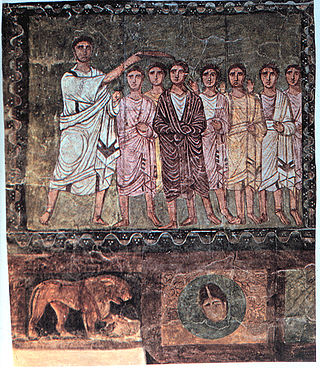
In Abrahamic religions, a messiah or messias is a saviour or liberator of a group of people. The concepts of mashiach, messianism, and of a Messianic Age originated in Judaism, and in the Hebrew Bible, in which a mashiach is a king or High Priest traditionally anointed with holy anointing oil.
This is a list of notable events in the development of Jewish history. All dates are given according to the Common Era, not the Hebrew calendar.
Scholars have studied and debated Muslim attitudes towards Jews, as well as the treatment of Jews in Islamic thought and societies throughout the history of Islam. Parts of the Islamic literary sources give mention to certain Jewish groups present in the past or present, which has led to debates. Some of this overlaps with Islamic remarks on non-Muslim religious groups in general.

Islamic–Jewish relations comprise the human and diplomatic relations between Jewish people and Muslims in the Arabian Peninsula, Northern Africa, the Middle East, and their surrounding regions. Jewish–Islamic relations may also refer to the shared and disputed ideals between Judaism and Islam, which began roughly in the 7th century CE with the origin and spread of Islam in the Arabian peninsula. The two religions share similar values, guidelines, and principles. Islam also incorporates Jewish history as a part of its own. Muslims regard the Children of Israel as an important religious concept in Islam. Moses, the most important prophet of Judaism, is also considered a prophet and messenger in Islam. Moses is mentioned in the Quran more than any other individual, and his life is narrated and recounted more than that of any other prophet. There are approximately 43 references to the Israelites in the Quran, and many in the Hadith. Later rabbinic authorities and Jewish scholars such as Maimonides discussed the relationship between Islam and Jewish law. Maimonides himself, it has been argued, was influenced by Islamic legal thought.
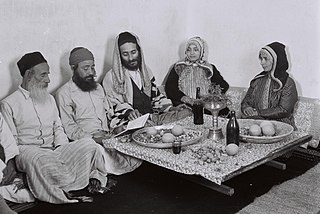
Yemenite Jews, also known as Yemeni Jews or Teimanim, are Jews who live, or once lived, in Yemen, and their descendants maintaining their customs. Between June 1949 and September 1950, the overwhelming majority of the country's Jewish population emigrated to Israel in Operation Magic Carpet. After several waves of persecution, the vast majority of Yemenite Jews now live in Israel, while smaller communities live in the United States and elsewhere. As of 2024, only five Jews remained in Yemen, with one of them being Levi Marhabi.

Judeo-Arabic dialects are ethnolects formerly spoken by Jews throughout the Arab world. Under the ISO 639 international standard for language codes, Judeo-Arabic is classified as a macrolanguage under the code jrb, encompassing four languages: Judeo-Moroccan Arabic (aju), Judeo-Yemeni Arabic (jye), Judeo-Egyptian Arabic (yhd), and Judeo-Tripolitanian Arabic (yud).

Aharon Appelfeld was an Israeli novelist and Holocaust survivor.
Elisha ben Abuyah was a rabbi and Jewish religious authority born in Jerusalem sometime before 70 CE. After he adopted a worldview considered heretical by his fellow Tannaim, the rabbis of the Talmud refrained from relating teachings in his name and referred to him as the "Other One". In the writings of the Geonim this name appears as "Achor" ("backwards"), because Elisha was considered to have "turned backwards" by embracing heresy.

Iranian Jews(Persian: یهودیان ایرانی Yahudiyān-e Irāni; Hebrew: יהודי איראן Yehudei Iran) constitute one of the oldest communities of the Jewish diaspora. Dating back to the biblical era, they originate from the Jews who relocated to Iran during the time of the Achaemenid Empire. Books of the Hebrew Bible bring together an extensive narrative shedding light on contemporary Jewish life experiences in ancient Iran; there has been a continuous Jewish presence in Iran since at least the time of Cyrus the Great, who led Achaemenid army's conquest of the Neo-Babylonian Empire and subsequently freed the Judahites from the Babylonian captivity.
Raphael Israeli is an Israeli historian and writer. He is a professor emeritus of Middle Eastern, Islamic and Chinese history at the Hebrew University of Jerusalem, as well as a research fellow at Truman Institute for the Advancement of Peace and the Jerusalem Center for Public Affairs.
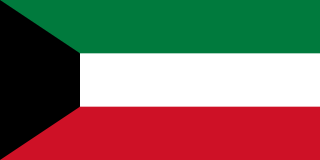
The history of the Jews in Kuwait is closely connected to the history of the Jews in Iraq.
Muslim supporters of Israel refers to both Muslims and cultural Muslims who support the right to self-determination of the Jewish people and the likewise existence of a Jewish homeland in the Southern Levant, traditionally known as the Land of Israel and corresponding to the modern polity known as the State of Israel. Muslim supporters of the Israeli state are widely considered to be a rare phenomenon in light of the ongoing Israeli–Palestinian conflict and the larger Arab–Israeli conflict. Within the Muslim world, the legitimacy of the State of Israel has been challenged since its inception, and support for Israel's right to exist is a minority orientation. Pro-Israel Muslims have faced opposition from both moderate Muslims and Islamists.
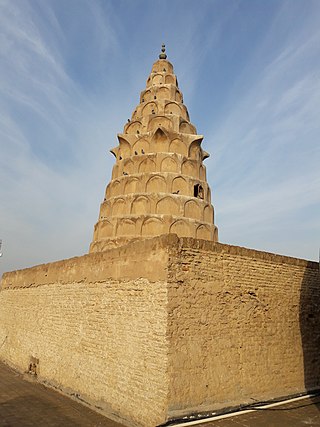
Ezekiel's Tomb is revered by Jews as the resting place of Ezekiel, an Israelite prophet who was deported from the Kingdom of Judah during the Babylonian captivity and serves as the eponymous protagonist of the Book of Ezekiel in the Hebrew Bible. Historically the oldest and most important Jewish site in Mesopotamia, it is now the location of the Al-Nukhailah Mosque, which was built on top of the original site and holds separate significance for Shia Muslims. The Jewish presence at Ezekiel's Tomb has greatly diminished since the Jewish exodus from Iraq in the 1950s, shortly after the beginning of the Arab–Israeli conflict. The larger complex has been extensively redeveloped since the 2003 invasion of Iraq; it is widely regarded by Muslims to be the resting place of Dhul-Kifl, an unknown Islamic prophet who is often identified with Ezekiel, and work was reportedly underway to convert the site's disused synagogue into a mosque.
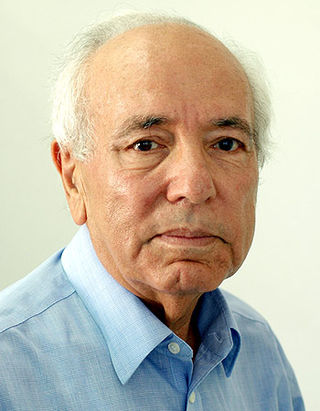
Sasson Somekh was an Israeli academic, writer and translator. He was professor emeritus of Modern Arab Literature at Tel Aviv University.
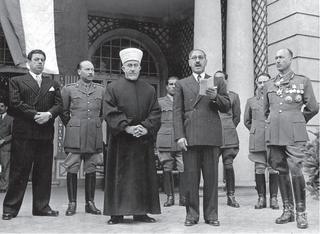
Relations between Nazi Germany (1933–1945) and the Arab world ranged from indifference and confrontation to collaboration. Nazi Germany used collaborators and propaganda throughout the Arab world in search of alliance for their political goals. One foundation of such collaborations was the antisemitism of the Nazis, which was shared by some Arab and Muslim leaders, most notably the exiled Palestinian leader, Grand Mufti of Jerusalem, Amin al-Husseini. Another foundation was the Nazi hostility towards the United Kingdom and France which held colonies in the Arab World. This hostility was used in Nazi propaganda to allege an anti-colonial common interest that Nazi Germany held. However this interest conflicted with interests of Nazi Germany's allies who held colonies in the Arab world, namely Spain, Vichy France and Italy, and thus had to manage competing interests in the region.

Yehudit Hendel was an award-winning Israeli author. She wrote novels, short stories, and non-fiction.

David Semah was an Israeli scholar of Arabic literature in Israel, and a professor at the Department of Arabic Language and Literature at the University of Haifa. As one of the founders, he remained closely involved in the Department's activities from its establishment in the mid-1960s and until his death.

The Alliance of Rabbis in Islamic States is a union of rabbis serving communities in Muslim-majority countries and regions, established by Rabbi Mendy Chitrik in 2019 with the objective of supporting Jewish life in Muslim countries and regions. It is the first rabbinic association in the Muslim world and serves at least 100,000 Jews throughout various countries. Its activity is approved by Sephardi Chief Rabbi of Israel Yitzchak Yosef.